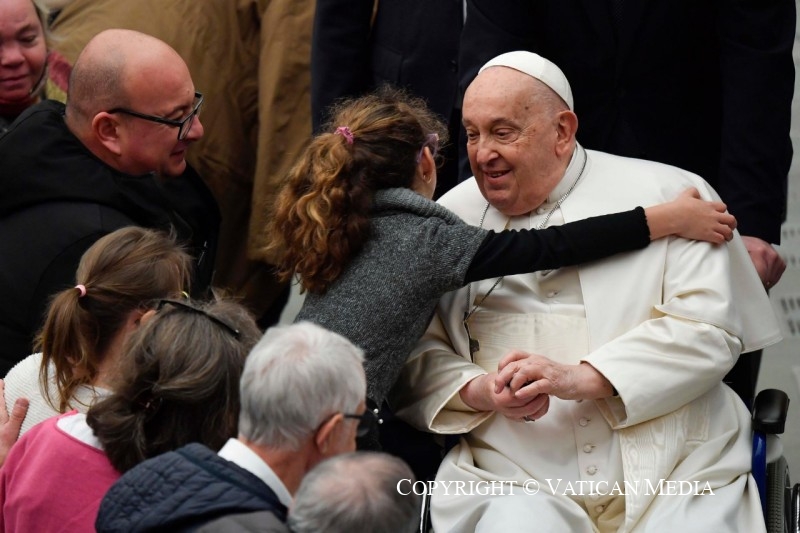Pope at audience: ‘Universal and one: the mystery of the Church’.
From St Peter's Square the invitation to pray the rosary ‘every day’. Entrusted to the ‘caring mother’ Ukraine, Palestine, Israel, Myanmar and Sudan, and the populations suffering ‘the madness of war’. The comment on the Holy Spirit in the Acts of the Apostles: the unity of the Church ‘is not achieved at the table, but in life’.
Vatican City (AsiaNews) - After a heartfelt invitation to ‘recite the rosary every day, confidently abandoning yourselves into the hands of Mary’, Pope Francis, this morning, from the parvis of St. Peter's at the end of the Wednesday general audience, recalled those populations ‘suffering the madness of war’.
‘In particular, the tormented Ukraine, Palestine, Israel, Myanmar, Sudan,’ he said in front of a packed square. Recalling that the current month of October is dedicated to the Holy Rosary - ‘a precious occasion to enhance this traditional Marian prayer’ -, he also entrusted to the Mother of Jesus ‘the sufferings and the desire for peace’ of the entire world.
Continuing the cycle of catechesis on the Holy Spirit, Francis today focused on the theme ‘All were filled with the Holy Spirit. The Holy Spirit in the Acts of the Apostles'. Commenting on the passage from Acts 11:15-27, proclaimed in the different languages at the opening of the audience, the Holy Father underlined how St Luke, the author, highlights that ‘the Holy Spirit is the One who ensures the universality and unity of the Church’.
After receiving the Holy Spirit, the Apostles come out of the Upper Room to announce Jesus to the crowd. There are two ways in which the Spirit works for the unity of the Church. ‘On the one hand, he pushes the Church outwards, so that it can welcome more and more people and peoples; on the other hand, he gathers it within to consolidate the unity achieved.’
‘Universal and one. This is the mystery of the Church,' said the Pontiff. To explain to the faithful the movement of universality - ‘their origin expresses the universality of the Church,’ he had said on Sunday at the end of the Angelus, announcing the creation of 21 new cardinals - he spoke of chapter 10 of Acts, where the conversion of Cornelius is narrated, an episode where the barrier ‘between Jews and pagans’ fell. ‘To this ethnic expansion is added geographical expansion,’ he added, recalling the dream narrated again in Acts and fulfilled by St Paul, which led him to Macedonia and then to the gates of Europe, a new continent.
Dwelling on the unity of the Church, the Bishop of Rome noted that it is emphasised in Chapter 15, where the ‘unfolding of the so-called Council of Jerusalem’ is recounted. ‘The problem is how to ensure that the universality achieved does not compromise the unity of the Church. The Holy Spirit does not always work unity abruptly,’ he said. Instead, he works ‘with a discreet work, respectful of the times and human differences, passing through people and institutions, prayer and confrontation. In a manner, we would say today, synodal’.
‘The Holy Spirit does not work the unity of the Church from the outside; He does not merely command us to be united. It is He Himself who is the bond of unity. It is He who makes the unity of the Church,' he added. The speech was concluded with some suggestions.
‘The unity of the Church is unity between persons and is not realised at the table, but in life. It is realised in life,' Francis recalled. An action that is fraught with difficulties, even within marriage and the family. ‘The reason for this difficult unity between us is that everyone wants, yes, unity to be achieved, but around their own point of view,’ he said. Thus, ‘the unity of life, the unity of Pentecost, according to the Spirit, is achieved when we strive to put God at the centre, not ourselves. Christian unity is also built in this way'.







.png)










